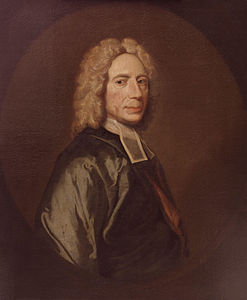Hymn 37 part 1
Isaac Watts 1674 (Southampton, Hampshire) – 1748 (Stoke Newington, Middlesex)
Christ's humiliation, exaltation, and triumph.
Phil. 2:8,9; Mark 15:20,24,29; Col. 2:15.
The mighty frame of glorious grace,
That brightest monument of praise
That e'er the God of love designed,
Employs and fills my lab'ring mind.
Begin, my soul, the heav'nly song,
A burden for an angel's tongue:
When Gabriel sounds these awful things,
He tunes and summons all his stungs.
Proclaim inimitable love:
Jesus, the Lord of worlds above,
Puts off the beams of bright array,
And veils the God in mortal clay!
What black reproach defiled his name,
When with our sins he took our shame!
He whom adoring angels blessed
Is made the impious rebel's jest.
He that distributes crowns and thrones
Hangs on a tree, and bleeds, and groans!
The Prince of Life resigns his breath,
The King of Glory bows to death!
But see the wonders of his power,
He triumphs in his dying hour;
And while by Satan's rage he fell,
He dashed the rising hopes of hell.
Thus were the hosts of death subdued,
And sin was drowned in Jesus' blood;
Thus he arose, and reigns above,
And conquers sinners by his love.
Who shall fulfil this boundless song?
The theme surmounts an angel's tongue:
How low, how vain are mortal airs,
When Gabriel's nobler harp despairs!
Font size:
Submitted on May 13, 2011
Modified on March 05, 2023
- 1:09 min read
- 52 Views
Quick analysis:
| Scheme | X A BXCC DEXB FFXA GGHH BXII JJAA XXFF DEKK |
|---|---|
| Closest metre | Iambic tetrameter |
| Characters | 1,199 |
| Words | 221 |
| Stanzas | 10 |
| Stanza Lengths | 1, 1, 4, 4, 4, 4, 4, 4, 4, 4 |
Translation
Find a translation for this poem in other languages:
Select another language:
- - Select -
- 简体中文 (Chinese - Simplified)
- 繁體中文 (Chinese - Traditional)
- Español (Spanish)
- Esperanto (Esperanto)
- 日本語 (Japanese)
- Português (Portuguese)
- Deutsch (German)
- العربية (Arabic)
- Français (French)
- Русский (Russian)
- ಕನ್ನಡ (Kannada)
- 한국어 (Korean)
- עברית (Hebrew)
- Gaeilge (Irish)
- Українська (Ukrainian)
- اردو (Urdu)
- Magyar (Hungarian)
- मानक हिन्दी (Hindi)
- Indonesia (Indonesian)
- Italiano (Italian)
- தமிழ் (Tamil)
- Türkçe (Turkish)
- తెలుగు (Telugu)
- ภาษาไทย (Thai)
- Tiếng Việt (Vietnamese)
- Čeština (Czech)
- Polski (Polish)
- Bahasa Indonesia (Indonesian)
- Românește (Romanian)
- Nederlands (Dutch)
- Ελληνικά (Greek)
- Latinum (Latin)
- Svenska (Swedish)
- Dansk (Danish)
- Suomi (Finnish)
- فارسی (Persian)
- ייִדיש (Yiddish)
- հայերեն (Armenian)
- Norsk (Norwegian)
- English (English)
Citation
Use the citation below to add this poem to your bibliography:
Style:MLAChicagoAPA
"Hymn 37 part 1" Poetry.com. STANDS4 LLC, 2024. Web. 26 Apr. 2024. <https://www.poetry.com/poem/19533/hymn-37-part-1>.



Discuss the poem Hymn 37 part 1 with the community...
Report Comment
We're doing our best to make sure our content is useful, accurate and safe.
If by any chance you spot an inappropriate comment while navigating through our website please use this form to let us know, and we'll take care of it shortly.
Attachment
You need to be logged in to favorite.
Log In